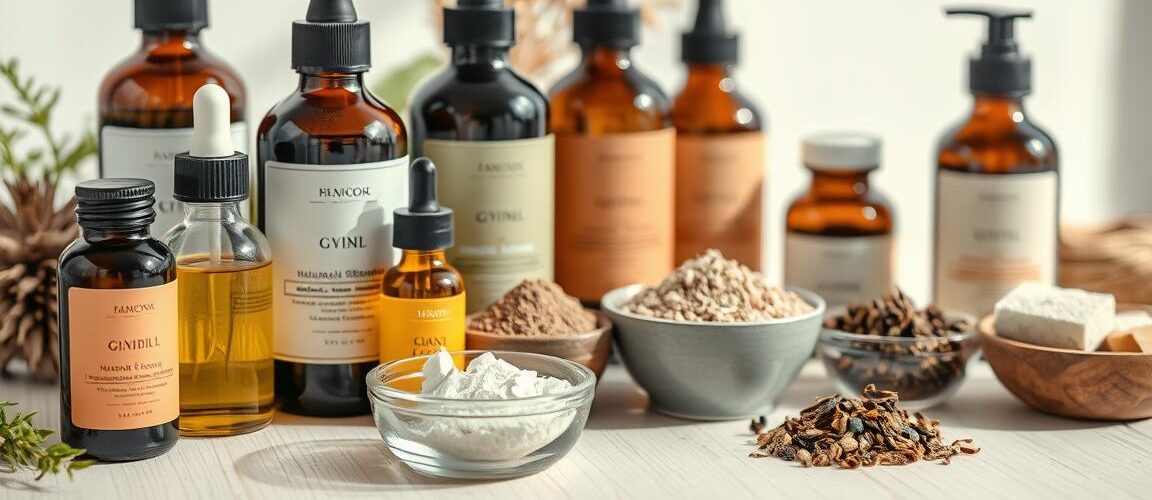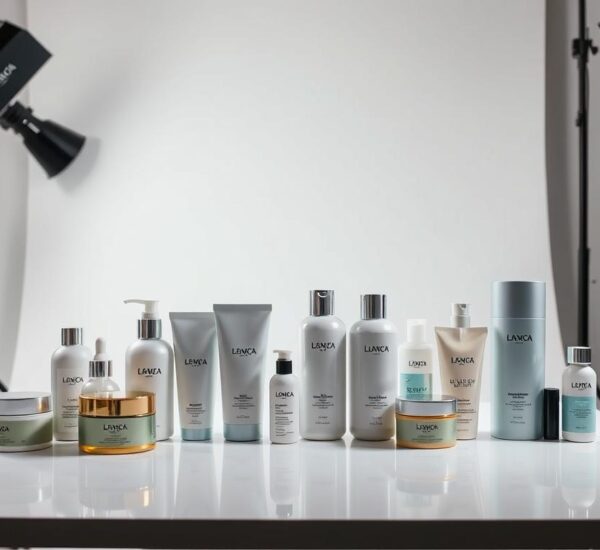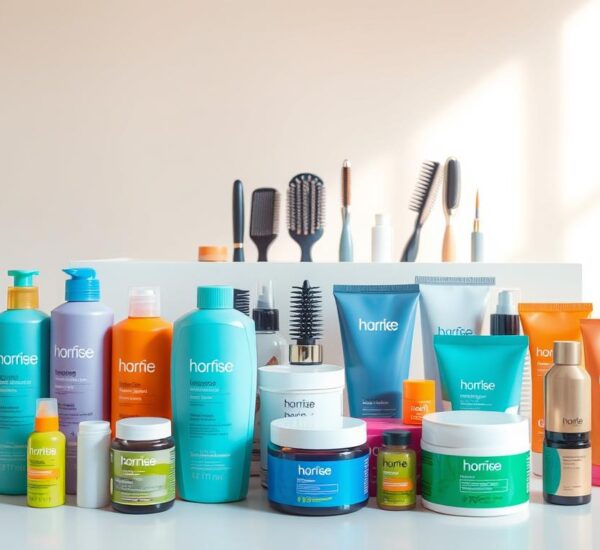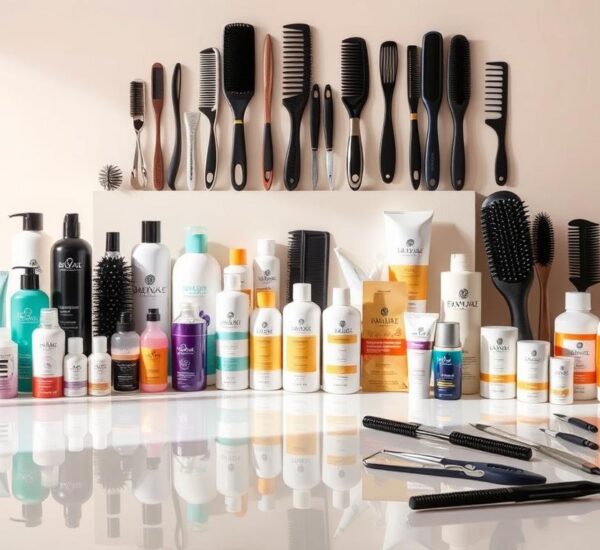Many of us dream of having vibrant, healthy hair. We look for the perfect mix of nourishment and protection. The right haircare ingredients are key to achieving this.
Natural ingredients are popular for their benefits to hair. Aloe vera and coconut oil are known for moisturizing and nourishing hair. They help promote healthy growth.
Knowing the benefits of haircare ingredients helps us make better choices. This knowledge lets us pick products that really help our hair. It leads to hair that looks vibrant and healthy.
Key Takeaways
- Natural ingredients like aloe vera and coconut oil are beneficial for hair health.
- Using the right haircare ingredients is key for vibrant, healthy hair.
- Nourishing and moisturizing properties promote healthy hair growth.
- Informed choices about haircare routines lead to better hair health.
- Understanding haircare ingredients helps in selecting the right products.
Understanding Hair Structure and Needs
To have healthy, vibrant hair, we need to know its structure and needs. Hair is more than just a part of our look; it shows our health and wellbeing. Knowing about hair composition and type helps us pick the best haircare ingredients.
The Basics of Hair Composition
Hair is mostly keratin protein, with lipids, minerals, and pigments too. The hair shaft has three layers: medulla, cortex, and cuticle. The cuticle is the outer layer, protecting hair from damage. Knowing this helps us choose the right haircare products.
Identifying Different Hair Types
Hair types include dry, oily, combination, curly, and straight. Each type needs something different. For example, dry hair needs lots of moisture, while oily hair needs products that control oil without drying out the scalp. Knowing our hair type is key to a good haircare routine.
How Hair Needs Change by Season
Seasonal changes affect our hair’s needs. In the dry winter, hair gets drier and more brittle, needing more moisture. In the humid summer, hair gets oilier, needing light, oil-controlling products. Changing our haircare with the seasons is important for healthy, vibrant hair.
Why Ingredients Matter in Haircare
Haircare ingredients are more than just additives. They are the foundation of healthy, vibrant hair. The products we use can either nourish or damage our hair. It’s important to understand the role of these ingredients.
Impact of Natural vs. Synthetic Ingredients
The debate between natural and synthetic ingredients in haircare is ongoing. Experts suggest that natural ingredients are generally safer and more beneficial for long-term hair health. Natural ingredients like essential oils for haircare are full of nutrients and antioxidants. They promote healthy hair growth and strengthen hair follicles.
Synthetic ingredients can sometimes cause irritation or allergic reactions. This can damage the hair and scalp. Using products with natural ingredients can be great for those wanting to improve their hair’s natural texture and growth.
For example, detoxing the scalp with natural ingredients can remove buildup without harsh chemicals. This promotes a healthier scalp environment for hair growth.
The Role of pH Balance in Hair Health
The pH balance of haircare products is key to maintaining hair health. The natural pH of the hair and scalp is slightly acidic, ranging from about 4.5 to 5.5. Using products that are too alkaline can disrupt this balance, leading to cuticle damage and frizz.
It’s essential to choose pH-balanced products to maintain the hair’s cuticle integrity. This ensures the hair remains healthy and shiny. Maintaining the right pH balance also enhances the effectiveness of haircare ingredients for growth. When the hair’s pH is balanced, it absorbs nutrients and treatments better.
Key Moisturizing Ingredients for Dry Hair
Dry hair can be tough to handle, but the right ingredients can help. Moisturizing is key, as dry hair is brittle and breaks easily. By using the right ingredients, we can make our hair healthy and strong.
The Benefits of Aloe Vera
Aloe vera is great for soothing and moisturizing hair. It keeps moisture in, fights dandruff, and soothes an itchy scalp. Aloe vera is perfect for dry hair, making it healthier and easier to manage.
Coconut Oil: A Deep Moisturizer
Coconut oil is famous for its deep moisturizing. It goes deep into the hair shaft, giving it lots of hydration and nourishment. Coconut oil’s fatty acids fix dry, damaged hair, making it softer and stronger.
Hyaluronic Acid in Hair Products
Hyaluronic acid is a strong humectant that holds moisture in hair. It’s used in skincare and haircare. Hyaluronic acid keeps hair moisturized, making it look healthy and shiny.
Nourishing Ingredients for Strong Hair
Nourishing ingredients are key for strong and growing hair. Knowing what makes hair healthy is important.
The Power of Keratin
Keratin is a protein that makes up hair. It helps repair and rebuild hair, making it stronger. Using keratin products can greatly improve hair’s texture and strength.
Biotin’s Role in Hair Growth
Biotin is a B-complex vitamin that aids in hair growth. It turns nutrients into energy for hair growth. For more on biotin and hair, check out biotin myths and its role in strengthening.
How Amino Acids Strengthen Hair
Amino acids are vital for hair health. They help repair damaged hair and boost strength and elasticity. Amino acids are found in many haircare products, making hair healthier and stronger.
Here’s a comparison of keratin, biotin, and amino acids for hair benefits:
| Ingredient | Primary Benefit | Additional Benefits |
|---|---|---|
| Keratin | Repairs and rebuilds hair | Improves texture and strength |
| Biotin | Promotes hair growth | Converts nutrients into energy for hair follicles |
| Amino Acids | Repairs damaged hair | Improves hair strength and elasticity |
Repairing Damaged Hair with Essential Ingredients
Damaged hair can be frustrating, but there are solutions. Certain haircare ingredients can fix the problem. We’ll look at how argan oil, shea butter, and vitamin E can make hair healthy again.
The Benefits of Argan Oil
Argan oil is great for moisturizing hair. It’s full of antioxidants and fatty acids that nourish and protect. Using argan oil can greatly improve damaged hair’s health and look.
Nourishing Properties: Its oleic and linoleic acids deeply moisturize hair, making it soft and easy to manage.
Antioxidant Benefits: Argan oil’s antioxidants shield hair from environmental damage and free radicals.
Shea Butter for Restoration
Shea butter is also excellent for damaged hair. It deeply hydrates and repairs hair’s damaged cuticles.
- Shea butter’s emollient properties keep moisture in, reducing dryness and breakage.
- Its vitamins A and E improve hair health and shine.
Vitamin E as an Antioxidant
Vitamin E is a key antioxidant for hair health. It protects hair from free radicals and promotes a healthy scalp.
Protective Effects: Vitamin E’s antioxidants keep the hair follicle healthy, supporting hair growth.
To understand these ingredients better, let’s compare their benefits:
| Ingredient | Primary Benefit | Key Nutrients |
|---|---|---|
| Argan Oil | Moisturizing and nourishing | Oleic and linoleic acids, antioxidants |
| Shea Butter | Hydrating and repairing | Vitamins A and E, fatty acids |
| Vitamin E | Antioxidant protection | Antioxidants |
Knowing how these ingredients work can improve our haircare routine. Adding them can make our hair healthier and more resilient.
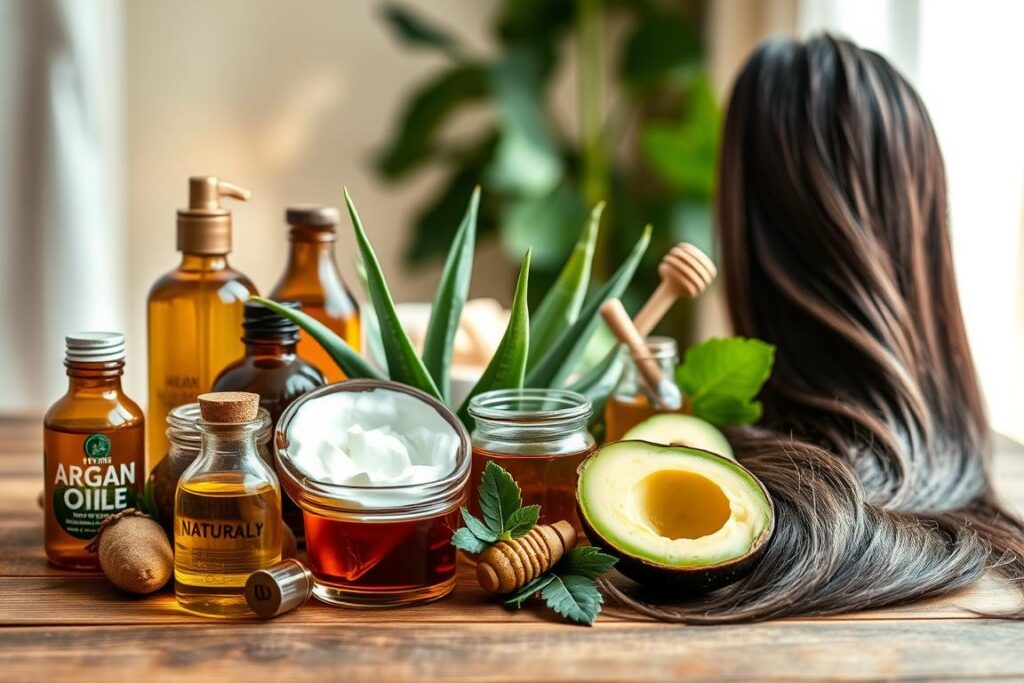
Using products with argan oil, shea butter, and vitamin E can fix damaged hair. These ingredients offer quick benefits and long-term hair health.
Natural Oils: A Versatile Haircare Ingredient
Natural oils are key in haircare, providing many benefits. They are great for the scalp, conditioning, and protecting hair. We’ll look at jojoba, olive, and castor oils, their benefits, and uses.
Jojoba Oil for Scalp Health
Jojoba oil balances the scalp’s pH, helping hair grow. It’s absorbed easily, making it a good scalp moisturizer without being greasy. Jojoba oil is similar to the scalp’s natural oils, making it perfect for scalp health.
Olive Oil: Nature’s Conditioner
Olive oil is full of antioxidants and has been a natural conditioner for ages. It deeply moisturizes hair, making it soft and easy to manage. Olive oil is great for dry or damaged hair because of its hydrating properties.
Castor Oil for Hair Growth
Castor oil is famous for helping hair grow. It has ricinoleic acid, which boosts blood flow to the scalp, promoting hair growth. Castor oil also reduces scalp irritations with its anti-inflammatory properties.
Let’s compare jojoba, olive, and castor oils in haircare:
| Oil | Primary Benefit | Additional Benefits |
|---|---|---|
| Jojoba Oil | Balances scalp pH | Moisturizes without greasiness |
| Olive Oil | Deeply nourishes hair | Antioxidant properties |
| Castor Oil | Promotes hair growth | Reduces scalp irritations |
Natural oils like jojoba, olive, and castor are versatile and beneficial for hair. Knowing their unique benefits helps us pick the right oil for our hair, improving our haircare routine.
Botanical Extracts in Haircare Products
Botanical extracts are a natural way to take care of your hair. They come from plants and have been used for ages. They’re great for those who want to avoid harsh chemicals in their hair products.
Antioxidant Properties of Green Tea Extract
Green tea extract is famous for its antioxidants. These protect your hair from damage. Antioxidants in green tea extract also help with dandruff and soothe the scalp.
Peppermint Oil for Scalp Stimulation
Peppermint oil cools your scalp and boosts blood flow. This can invigorate hair growth and ease scalp stress.
Chamomile for Soothing Effects
Chamomile is known for calming irritated scalps. It reduces inflammation and helps create a healthy scalp environment.
Here’s a comparison of the benefits of these botanical extracts:
| Botanical Extract | Primary Benefit | Additional Benefits |
|---|---|---|
| Green Tea Extract | Antioxidant Properties | Reduces dandruff, soothes the scalp |
| Peppermint Oil | Scalp Stimulation | Invigorates hair growth, cooling sensation |
| Chamomile | Soothing Effects | Reduces inflammation, promotes healthy scalp |
Using botanical extracts in haircare can be a game-changer for those seeking natural solutions.
In conclusion, adding green tea, peppermint oil, and chamomile to haircare products can greatly improve hair health. They address scalp issues and help achieve healthier, more vibrant hair.
Essential Vitamins for Healthy Hair
Vitamins are key to keeping our hair healthy. They nourish the scalp and help hair grow. Eating foods rich in vitamins is important for vibrant hair. Let’s look at the main vitamins for hair health and what they do.
Vitamin A: Nourishment for Scalp and Follicles
Vitamin A is essential for a healthy scalp and hair follicles. It helps control hair growth and keeps the scalp healthy. Eating foods like sweet potatoes and carrots can help your scalp.
Vitamin D and Its Impact on Hair Growth
Vitamin D is important for hair growth. Studies show it helps hair follicles grow normally. Getting enough Vitamin D from sun, diet, or supplements can help hair grow.
The Role of Vitamin C in Collagen Production
Vitamin C is key for making collagen, a hair structure protein. It also protects hair follicles from damage. Eating foods like citrus fruits and berries can help your hair stay healthy.
Knowing the role of these vitamins is important. We need to get enough from our diet or supplements. Adding these vitamins to our haircare can greatly improve hair health and look.
The Importance of Proteins in Haircare
Proteins are key in haircare, giving hair repair, volume, and strength. They are vital for healthy hair. Different proteins offer different benefits.
Proteins like hydrolyzed silk, wheat, and soy are great for hair. Hydrolyzed silk protein repairs and adds shine. It fills in damaged hair, making it look healthier and more vibrant.
Hydrolyzed Silk Protein: Repair and Shine
Hydrolyzed silk protein is a top choice for haircare. It fixes damaged hair by filling gaps, reducing breakage, and boosting elasticity. This makes hair stronger and shinier.
Wheat Protein for Volume
Wheat protein is great for adding volume to fine or limp hair. It coats the hair shaft, making it thicker and adding volume and texture.
Soy Protein for Strength
Soy protein strengthens hair. It fortifies the hair shaft, reducing breakage and improving health. It’s good for damaged or weakened hair.
The benefits of these proteins are shown in the table below:
| Protein Type | Benefits | Best for |
|---|---|---|
| Hydrolyzed Silk Protein | Repair, Shine | Damaged Hair |
| Wheat Protein | Volume, Texture | Fine or Limp Hair |
| Soy Protein | Strength, Fortification | Weak or Damaged Hair |
Using these proteins in our haircare routine makes hair healthier and more resilient. They help repair, add volume, or strengthen hair, depending on what we need.
The Benefits of Conditioners and Masques
Conditioners and masques are key in our haircare routines. They offer many benefits for our hair. These products are made to nourish and protect our hair, making them essential haircare ingredients for healthy hair.
For those looking to improve their haircare, knowing about conditioners and masques is important. Conditioners help detangle hair, reduce breakage, and make hair easier to manage. Masques give hair an intense dose of nourishment, tackling issues like dryness, damage, or color fade.
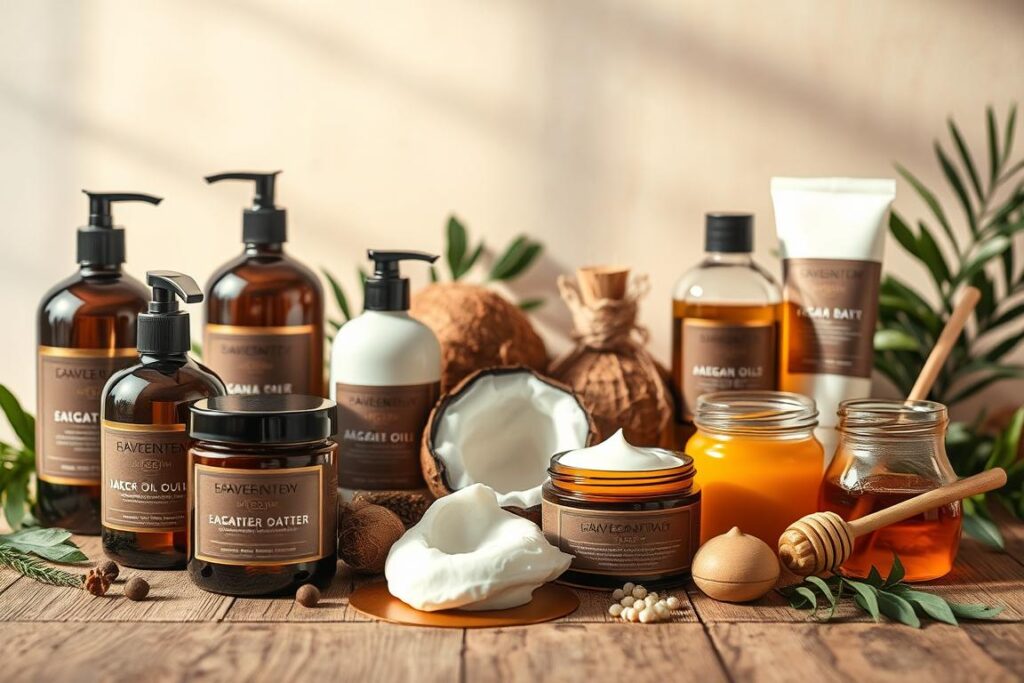
Leave-in Conditioners: Why We Love Them
Leave-in conditioners are loved for their ability to keep hair hydrated and protected all day. They smooth the hair cuticle, reduce frizz, and add shine. For those with dry or damaged hair, they can be a game-changer, making hair softer and easier to manage.
Choosing the right leave-in conditioner is key. For fine hair, a lightweight formula is best. Thicker hair might need something more hydrating.
Deep Conditioning Treatments Explained
Deep conditioning treatments penetrate deeper into the hair shaft, giving intense nourishment and repair. These treatments can be done at home or in a salon. They’re great for hair damaged by chemicals, heat styling, or environmental stress.
To learn more about hair treatments, check out rice water rinse for hair growth. It explores the science behind hair treatments.
How Often Should We Use Masques?
How often to use masques depends on your hair type and needs. Most hair types need a masque once or twice a week. But if you have dry, damaged, or color-treated hair, you might need to use it more often.
It’s also important to pick a masque that fits your hair type and concerns. Whether you want to hydrate, repair, or protect your hair, there’s a masque for you.
In conclusion, conditioners and masques are essential haircare ingredients for healthy hair. By understanding their benefits and adding them to our routine, we can get the vibrant, healthy hair we want.
Balancing Scalp Health with Essential Ingredients
Scalp health is key to a healthy head of hair. It’s important to use natural haircare ingredients that nourish and protect the scalp. Ingredients like coconut oil, olive oil, and shea butter are great for keeping the scalp healthy.
These ingredients moisturize and soothe the scalp, reducing irritation and itchiness. They also help to balance the scalp’s pH levels, creating a healthy environment for hair growth.
Using a haircare ingredients list that includes these essential ingredients can make a big difference. It ensures that your scalp gets the nourishment it needs to stay healthy and balanced.
By incorporating natural haircare ingredients into your routine, you can promote a healthy scalp and strong, beautiful hair. So, take the time to choose products that are formulated with these essential ingredients and give your scalp the care it deserves.
The Science Behind Hair Color Ingredients
To understand hair coloring, we need to know the ingredients involved. These ingredients help keep our hair healthy and bright. Hair coloring uses complex chemicals that can harm our hair. But, with the right ingredients, we can reduce damage and get the color we want.
Understanding Ammonia Alternatives
Ammonia has long been used in hair color because it opens up the hair shaft. But, it can be tough on hair, causing dryness and damage. Ammonia alternatives like ethanolamines and aminomethylpropanol are now used. They are gentler and make coloring more comfortable.
How Natural Dyes Affect Hair Health
Natural dyes, made from plants like henna and indigo, are popular for being safe and gentle. But, “natural” doesn’t always mean safe for everyone. Some natural dyes can cause allergic reactions or interact with other hair treatments. Yet, they are generally less damaging than chemical dyes.
Protecting Hair During Coloring Processes
To keep our hair safe during coloring, using pre-color treatments is helpful. Ingredients like coconut oil and argan oil moisturize the hair. Also, picking color products with protective ingredients can reduce damage.
| Ingredient Type | Function | Benefits | Potential Drawbacks |
|---|---|---|---|
| Ammonia | Opens hair shaft for coloring | Effective color penetration | Can be harsh, causing dryness and damage |
| Ammonia Alternatives | Gently opens hair shaft | Less damage, more comfortable | May not be as effective for all hair types |
| Natural Dyes | Colors hair without harsh chemicals | Generally less damaging, perceived as safer | Can cause allergic reactions, less predictable results |
In conclusion, knowing the science behind hair color ingredients is essential for healthy, vibrant hair. By picking the right ingredients and protecting our hair, we can enjoy our desired color without harming our hair.
Preservatives and Their Importance in Haircare
Preservatives are key in haircare products, keeping them safe and effective. They stop harmful bacteria, mold, and yeast from growing. This protects our health when we use these products.
It’s important to know about preservatives in haircare. Not all are safe or effective. Knowing what’s in our hair products helps us choose better for our hair.
Safe Preservatives We Can Trust
Some preservatives are known to be safe and work well. Phenonip and neolone are used a lot because they fight many kinds of germs. Potassium sorbate is also popular for its gentle yet strong preservation.
| Preservative | Characteristics | Common Uses |
|---|---|---|
| Phenonip | Broad-spectrum antimicrobial | Shampoos, conditioners |
| Neolone | Effective against bacteria and yeast | Hair masks, leave-in products |
| Potassium Sorbate | Gentle, effective against mold and yeast | Natural haircare products |
The Risks of Parabens in Hair Products
Parabens have raised health concerns in the beauty world. They might act like estrogen, causing hormonal issues. Many people now choose paraben-free hair products.
When buying hair products, always check the labels. Look for “paraben-free” or products with safer preservatives. Choosing the right preservatives helps keep our hair healthy.
DIY Haircare: Recipes for Natural Ingredients
We can get healthy, vibrant hair by using DIY haircare recipes. Natural ingredients are a great way to care for our hair. They avoid harsh chemicals found in some commercial products.
Simple Recipes Using Avocado
Avocado is full of nutrients and healthy fats. These can deeply nourish our hair. To make an avocado hair mask, mash a ripe avocado and add a tablespoon of olive oil.
Apply this mix to your hair, from roots to ends. Leave it on for about 30 minutes before rinsing with warm water. This can moisturize dry hair and add shine.
Honey-Based Treatments for Shine
Honey is a natural humectant that draws and holds moisture in our hair. This makes our hair soft and shiny. To make a honey hair treatment, mix equal parts honey and olive or coconut oil.
Apply this mix to the ends of your hair, working up to the roots. Leave it on for 20-30 minutes. Rinse with warm water to get smoother, shinier hair.
Essential Oils for Custom Scents
Essential oils add a nice smell and can benefit our hair and scalp. Lavender oil can relax and help scalp issues. Rosemary oil is believed to stimulate hair growth.
To use essential oils, add a few drops to your DIY hair masks. Or mix them with a carrier oil for a scalp massage.
By adding these DIY haircare recipes to our routine, we can care for our hair naturally. Trying different ingredients and recipes helps us tailor our haircare to our needs.
How to Read Haircare Labels Effectively
Reading haircare labels is key to better hair health. With many products out there, it’s easy to get lost. But, by knowing what to look for, we can pick the right products for our hair.
What to Look for in Product Ingredients
When checking haircare labels, find the haircare ingredients for healthy hair that fit your hair type. For dry or damaged hair, look for aloe vera and hyaluronic acid. For breakage-prone hair, keratin and biotin are good choices.
Also, watch out for ingredients that might irritate or cause allergies. Some preservatives or fragrances can be problematic. Choosing products that are gentle yet effective is important.
Understanding Ingredient Order of Importance
The order of ingredients on a label matters. It shows which ingredients are in the most amount. So, the first few ingredients are the main ones.
Look for products where the important essential haircare ingredients are listed first. For example, if you want a moisturizing shampoo, coconut oil or shea butter should be near the top.
By following these tips, we can make better choices for our hair. This way, we can find products that really meet our hair needs.
Final Thoughts on Choosing the Right Ingredients
Choosing the right haircare ingredients is key to getting vibrant, healthy hair. We’ve seen how natural ingredients and a good haircare list can greatly improve our hair’s health and look.
It’s important to make our haircare routine personal. We need to know our hair type and what it needs. Then, we can pick the right ingredients for the best results.
Tailoring Our Routine for Optimal Results
Being consistent with natural haircare ingredients is vital. Using the right products for our hair type can make a big difference over time. It’s about finding the right mix and sticking to it.
Maintaining Consistency for Long-Term Benefits
Following a well-thought-out haircare routine and using a list of ingredients is essential. This way, our hair gets the care it needs. Consistency and the right ingredients lead to healthy, vibrant hair.
